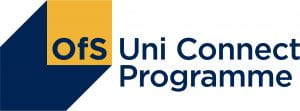Uni Connect is an Office for Students funded programme that was set up in 2017. The programme (formerly the National Collaborative Outreach Programme or NCOP) was designed to support the government’s goal that students’ access to higher education is not limited by their background, geographical location or characteristics.
Within the programme, 29 local partnerships of universities and other key stakeholders aim to deliver targeted higher education outreach activities to young people in Years 10 to 13 attending schools and colleges in England, focusing specifically the 997 wards where the higher education participation of young people has been shown to be lower than expected based on GCSE-level attainment alone. LiNCHigher is Lincolnshire’s Uni Connect partnership.
The Lincoln Academy of Learning and Teaching (LALT) has been commissioned by LiNCHigher to evaluate the impact of the programme across Lincolnshire where activities are being delivered in Boston, Gainsborough, Grantham, Lincoln City, South Holland and the Coastal area of the county. The evaluation adopts a mix-methods approach employing both national and local survey data, pre- and post-activity surveys, focus groups with school/college students and university ambassadors involved in the programme as well as interviews with school and project leads. This will provide a holistic understanding of what works and where for students in particular contexts.
This academic year LiNCHigher’s new Future Focus programme of workshops will be evaluated. The workshops have been designed to be for specific year groups, with four workshops on different topics for each year.
The evaluation team’s reports and publications can be found on LiNCHigher’s Future Focus website.

